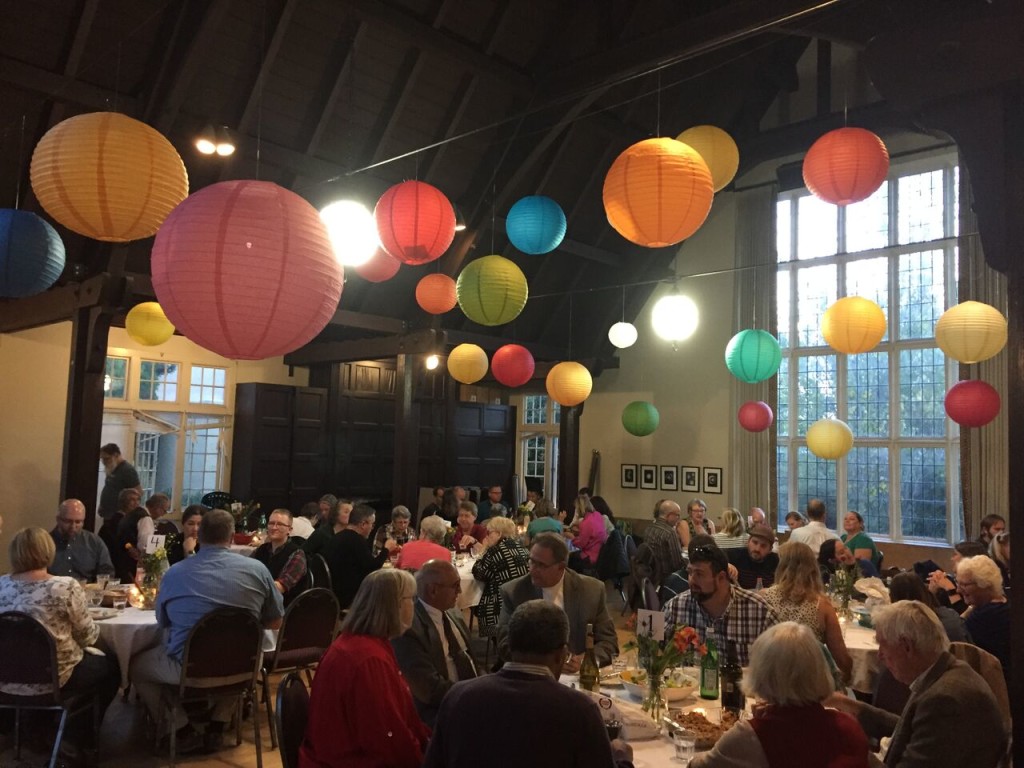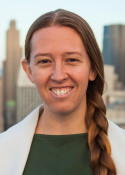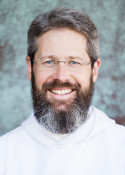FROM THE RECTOR
Speaking Truth to Power
I cannot tell you the number of times that I’ve been in a pickle, or unable to see a way forward, or felt like I was experiencing something never felt before in the history of humankind, only to rescued by the witness of a saint of the church.
That said, I’ve often scoffed at the notion that particular saints—say, kings or bishops—of centuries past really were the lights of the world their generations. But this week, once more, I am grateful for a witness of how the light of God shines through two saints in ways that illuminate our lives today.
The two saints are Robert Grosseteste, who died in 1253 and Hugh, who died in 1200, both coincidentally Bishops of Lincoln in England. I suppose that my skepticism of having bishops as saints, especially in this location and at this time in history, is the amount of temporal power that they wielded. In a kingdom interwoven with the dominant Christianity of the day, what many call Christendom, bishops held significant ecclesiastical, legal, financial, and governmental power. And many were not afraid to use, sometimes to abusive ends.
What was remarkable about these two bishops was myriad—depth of contemplation and practical wisdom for Hugh, breadth of learning and a pastoral heart for Robert. And, it seems, both of them were willing and able to stand up to the King of England, in matters large and small, not an easy act in their days or ours.
This is what helps me to realize that the 21st is not as different from the 12th and 13th centuries as we might be led to believe. Yes, the world of communication is unbelievably different. One tweet of solidarity for the protests in Hong Kong by Daryl Morey, the General Manager of basketball’s Houston Rockets, can impact global relations within hours in ways that these two bishops could not have imagined. But the response of those with power to those who challenge their authority is something that these saints knew well.
History is replete with the martyrdom (literally, the witness) of those who have been willing to speak truth to those with power, from John the Baptist’s critique of Herod taking his own brother’s wife, to Jamal Khashoggi’s reporting about the corruption within Saudi Arabia. Those who fear that their hold on power is tenuous will go to great lengths to silence the voices who dissent.
Perhaps that’s why I’ve been so frustrated by some of the response to Daryl Morey’s since deleted seven word tweet supporting the protestors of a proposed law that would allow extradition to mainland China. Several responses have simply focused on the bottom line, about how much money will be lost if the NBA doesn’t apologize for a stance that is contrary to the Communist Party of China’s stated position. The witness of Hugh and Robert in withstanding the desires of a monarch shines like a beacon to those who would walk away from the vulnerable.
One advantage that those bishops of the 12th and 13th century had was relationship, as they were in regular conversation with the powerful of their day. Hugh in particular is said to have defused tension with one king of England with a particularly sassy joke, and with another by physically (one would assume playfully) shaking him.
If we but look up from what we’re doing on any given day, we see the need for the powerful to be led towards justice and mercy. In a world where speaking truth to those in power brings great risk, I am thankful for the lives of Hugh and Robert, Bishops of Lincoln. May we be similarly led by those of this generation, people willing to speak truth, even at great cost.
Peace,
Phil+
Save the Date!
Stewardship Celebration Dinner

Please save the date — October 27th, 5:30-7:30 pm — for this year’s Stewardship Celebration Dinner. It’s a potluck feast by table, and are we ever in for a treat! More than just delicious, this is a night to come together as a whole parish family, to remember very concretely that we are in this together, and that it is only by all showing up together that this wonderful community can exist. The spirit of joy, connection and tender interdependence is always exceptionally present on this night, as we celebrate both the gifts that we have received, the generosity of this place, and also how we are so much more than the sum of our parts. You can count on good food and conversation with friends new and old, plus good fun and entertainment.
Youth (grades 6-12) come together around one massive banquet table, and children share a meal and fun of their own, with childcare provided. Truly, the night is hilarious, it’s a blast, it’s a wonderful way to pack the church and celebrate this amazing life we share. Mark your calendars and sign up here or on the clipboard in the back of the church!
Pushing the Limits of Imagination
 To apply the theoretical to the particular is a tendentious activity at best, and it provides a space to take a definite risk. It supplies an opportunity to step into the unknown and recognize what grounds your theory. Finally, it proposes a place to see how you steward your imagination to consider its limits. Or, so I am telling myself as I consider the question of stewardship in light of my research on madness, the cross, and unknowing.
To apply the theoretical to the particular is a tendentious activity at best, and it provides a space to take a definite risk. It supplies an opportunity to step into the unknown and recognize what grounds your theory. Finally, it proposes a place to see how you steward your imagination to consider its limits. Or, so I am telling myself as I consider the question of stewardship in light of my research on madness, the cross, and unknowing.
At a point, I see the intersection much more in the question of the risk of madness. This is not a colloquial sense of madness as insanity, but rather madness as a term used by society to encage and enclose. For Foucault in History of Madness, madness is the umbrella term used, ironically, both to name and control by society and that which could never be ultimately controlled.
The riskiness of madness is that it is never controllable.
The riskiness of stewardship is that it is never controllable.
The irony, of course, is that money, which is often the limit of our imagination around stewardship, seems to control everything.
What happens if stewardship becomes about living into an imagination pushed to the brink of madness? It suggests a vision of stewardship that is not controlled by money, outcomes, or balances. It indicates a concept of stewardship not limited by endowments, operating costs, or other financial statements.
Madness, then, is a way to reconsider what controls the imagination as we attempt to live in the Christian community. It is hard. It is risky. The Christian community, then, is reimagined as continually subversive of economic totalization.
This leads my theological thinking to the cross. If madness is anti-transactional or economic-resistant and thereby risky, then what does it say that the cross is “madness and a scandal?” (1 Corinthians 1:17-25) The madness of the cross resists transaction. Madness resists the cross being assumed into transactional categories of atonement or prayer. No longer do I see the Father as a benefactor of a sure transaction through the offering of the Son. Ultimately, God is placed in a state of risk concerning the Son because being human is risky and fraught with vulnerability. We see this in the Passion narratives, especially in the garden of Gethsemane and the crucifixion by the empire.
This leads me to prayer and discipleship. No longer is prayer seen through transactional means of an offer and a return. Discipleship and prayer are risky when thought in the context of the madness of the cross. The offering of money, time, and the self to the community of the cross assumes the risk subverting the financial spreadsheet for a life lived into love or madness or maybe both.
Stewardship is, then, placed as an event of madness because it is a risk. This riskiness compels a consideration of what limits the imagination of each disciple and each community. The danger, I suggest, is ultimately worth it as it subverts any claim on our imagination that compels cages, limits, or transactions. We live, then, into the madness of the claim of God on our lives and boldly live into a community that seeks to do the same.
— Stephan Quarles, PhD
From the Senior Warden
 On Pitching In
On Pitching In
At All Souls, we practice doing things differently from many of the ways the world offers us. We practice a different kind of relationship with each other, one in which we are all seekers and siblings in Christ. And that also translates to practicing a different kind of relationship to how we use our money.
>We all have plenty of practice buying things. I give you a some agreed-upon amount of money and in return you give me some amount of new shoes or car repairs or therapy sessions or Netflix.
We also have plenty of practice giving charitably. From what I know of the people at All Souls, I’d wager everyone here practices giving money away in some capacity, whether to a worthy organization or a friend’s go-fund-me or someone panhandling on the street or a co-worker’s Race for the Cure. We practice giving as benefactors who don’t expect anything in return.
But what we get to practice at All Souls isn’t buying or giving, it’s more like pitching in. Not because we’ll get something back (though we will), not because we’ll feel generous and help others (though we will), but because we are here and we depend on each other.
God asks us to love each other (our neighbors) as ourselves. Not as participants in a transaction or as benefactors and recipients of each other’s charity, not as consumers or buyers and sellers, but as a collective that comprises body of Christ.
I like to think about it like food. Putting our money into All Souls is not like eating out or buying a fancy meal. It’s also not like giving to the food pantry, where we give but don’t expect to eat ourselves. It’s a potluck. It’s a meal where we bring food and don’t think of it as giving away but as pitching in to making something delicious and celebratory and even heavenly. Together.
In a month, when we celebrate at our in-gathering dinner, we’ll have a giant potluck. The members of the vestry will bring main dishes for our tables and we’ll ask you to pitch in and bring the rest. I find myself grateful, as always, to practice a pitching-in way of being together with you all, and I’ll look forward to seeing you there.
— Laura Eberly
Guest Preacher this Sunday
We are thrilled to welcome José Quinonez to preach with us at all three services. Jose is the founder and CEO of the Mission Asset Fund, a MacArthur Fellow, and a member of Christ Episcopal Church in Alameda.
BAPTISMS
Are you interested in being baptized? Or do you have a child you would like to have baptized? The next opportunity is All Souls/All Saints’ Day on November 3rd. See Phil or Liz if you are wanting more information.
HELP ADDRESS HUNGER!
Looking for a way to serve? Come this Sunday to help with our Open Door Dinner, offering a delicious meal of homemade jambalaya to anyone who is hungry. Come back to church at 2p to help prep, 4p to serve, or 5p to help clean up. Contact Nate Conable or Melissa Devereaux for more information, melissa.devereaux@gmail.com or nateconable@gmail.com.




